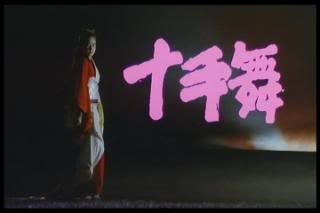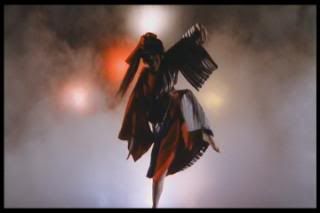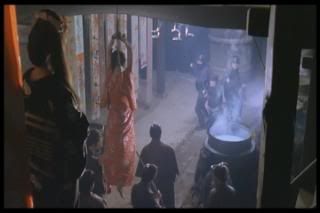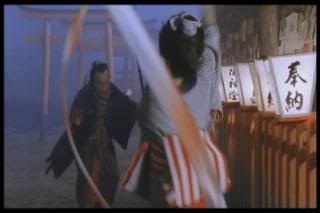
What happened, Hideo Gosha? You used to be cool.
Jittemai (Death Shadows) is an extremely campy yakuza flick, featuring mute assassins, insane (and corrupt) police officers, and sexy female cutthroats. It’s filmed on a cheap and gaudy soundstage, and punctuated by dance sequences. Yes, really. The best way I could possibly describe it is to say its something like an episode of the old Batman TV show, except with nudity and violence.

Absent from Jittemai is Gosha’s long-time collaborator Tatsuya Nakadai. Perhaps it was Nakadai’s job to vet the screenplays, in which case his absence explains Gosha’s lack of sound judgment in choosing this project. Without Nakadai around to classy-up the joint, one can’t help but notice how second-rate most of the acting is. But I digress.
The plot of Jittemai goes like this: rather than die for their crimes, three men agree to become “Shadows,” assassins who work for the law while circumventing it. In exchange for their lives, though, they loose their vocal chords--which apparently only requires a quick slash of the katana to accomplish. This is more or less the same way Kiichi Hogan, samurai of silence, lost his voice, so maybe Gosha was just rehashing one of his old stories.
One of these Shadows, Yasuke the Viper (Takuzo Kawatani), is sent on a mission to kill Denzo (Takeo Chii), a local crime lord. Upon infiltrating Denzo’s property, he discovers that one of the crime lord’s henchmen is--shock!--his estranged daughter. The daughter, Ocho (Mariko Ishihara), has been raised as a killer by Denzo, and hates her father for having abandoned her and her mother long ago. We learn all of this by way of a conversation between the two of them. What’s this, a conversation? But isn’t Yasuke the Viper mute? Why yes, yes he is, but that doesn’t stop him from using sign-language, and it doesn’t stop the film from giving him a voice-over anyway. He’s an extremely talkative mute. Anyway, one thing leads to another, and Denzo discovers the family relation, and soon he’s holding Ocho hostage. Yasuke the Viper gives his life to save her, and in doing so regains his daughter’s trust and love.

You’d think that’d be the entire film. It isn’t. That’s just the first twenty minutes. Then it gets strange.
Ocho takes Yasuke’s place as a “Shadow,” and, wielding a multi-coloured ribbon (!) as a weapon, she is sent on a dangerous mission, too complicated and mind-blowing to go over here.

The world of Jittemai is totally saturated with corruption. Priests rob the dead and sell their belongings and--worse still--this seems to be common knowledge. The police are so corrupt there seems to be no way to tell between them and the criminals they fight. Chief among these police officers is Boss Hell, who is probably the most entertaining character in the film. It helps that the actor seems to be one of the few people in the film who realizes he’s in a campy piece of crap. He acts absolutely insane, which was a good choice on the part of the actor, because his motivations are almost impossible to comprehend.
Jittemai is an extremely disappointing film, and it doesn’t make me enthusiastic to see Gosha’s later work. Despite the negative tone I’ve taken towards it, I suspect some people will enjoy it for its bizarre campiness alone. Like most of Gosha’s films, it’s only available, in North America, as a bootleg, though the one that’s easiest to obtain actually has dubbing, which is a rarity (although not really a welcome one). To be avoided.










3 comments:
And thus ends "Hideo Gosha week."
You are awesome, Ash, but you've cost me like $100 this week trackind down all of the samurai DVD's you've reviewed.
Jesus, I sure hope you like them, then.
Post a Comment